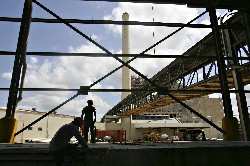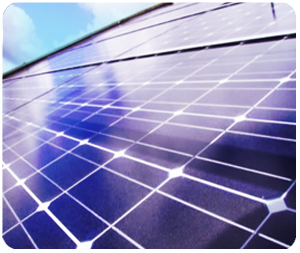 We held a press conference yesterday in San Antonio at the Pearl Brewery, which is currently being renovated and, upon its completion, will have the largest solar array panel in the state of Texas. Installed by Austin’s own Meridian Solar, the new system is expected to generate 25% of the energy needs for the new building, which will hold condos, an Aveda hair salon, and an art gallery.
We held a press conference yesterday in San Antonio at the Pearl Brewery, which is currently being renovated and, upon its completion, will have the largest solar array panel in the state of Texas. Installed by Austin’s own Meridian Solar, the new system is expected to generate 25% of the energy needs for the new building, which will hold condos, an Aveda hair salon, and an art gallery.
San Antonio is not the first to take on a solar power “experiment” — Houston turned a parking lot into an eco-park that has topped all of its park buildings with solar paneling, and is attempting pull all of its energy usage from solar panels.
With all the advancements of the solar industry, it is a wonder why everyone isn’t just as excited about all the possibilities solar energy systems can offer.
Our past concerns about the reliability of solar energy—“But what will we do if it’s raining?”—now seem archaic. Over the past decade leading companies have been making sweeping advancements, and now solar technology is more reliable, affordable, and efficient than ever.
 What we have developed now is far from the sea of reflective solar panels in that unforgettable scene from Gattaca. New technology consists of a flexible sheet-like material that can simply be laid on top of already existing structures, such as the roofs of buildings. This particular type of solar technology is a branch of material called Photovoltaics (“PV”) that was actually first used to power satellites back in the 1950’s. The thin-film PV works the same way to convert energy derived from light into electricity, is only a few millionths of a meter thick, and now can be readily and easily installed onto almost any building.
What we have developed now is far from the sea of reflective solar panels in that unforgettable scene from Gattaca. New technology consists of a flexible sheet-like material that can simply be laid on top of already existing structures, such as the roofs of buildings. This particular type of solar technology is a branch of material called Photovoltaics (“PV”) that was actually first used to power satellites back in the 1950’s. The thin-film PV works the same way to convert energy derived from light into electricity, is only a few millionths of a meter thick, and now can be readily and easily installed onto almost any building.
A more familiar type of PV is silicon-based, which can also be made into flexible rolls that can top any surface. And as technology keeps getting better, the production costs keep on dropping. It is now even possible for solar conductors to be constructed directly into building materials, called Building Integrated Solar. Consider this: Thin-Film PV could cover all eastern and western facing windows, or on your car windshield, providing clean, beautiful energy with no visible interference.
In response to “rainy day concerns,” our new solar report, Texas Solar Roadmap, demonstrates that it isn’t as big of a concern as we think. (more…)


